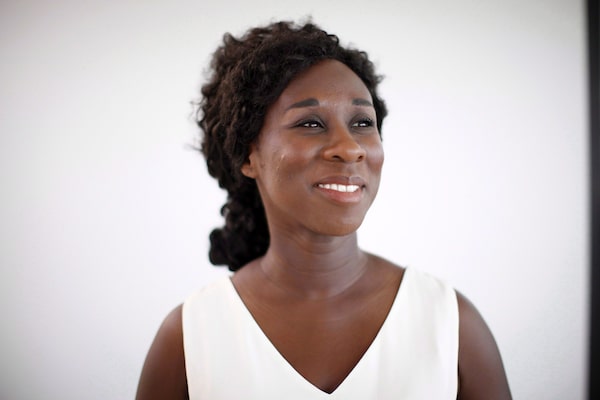
Canadian novelist Esi Edugyan, at home in Victoria, has been short listed for the Man Booker Prize for her book Washington Black.CHAD HIPOLITO/The Canadian Press
The phone rang very early in the morning at Esi Edugyan’s house outside Victoria, B.C. It was her U.K. editor with the news that Ms. Edugyan’s novel Washington Black made the short list for the Man Booker Prize. Her children, aged three and five, were not yet out the door for school.
“My son kept trying to snatch the phone from my ear, convinced it was his piano teacher calling. It was a chaotic, supremely wonderful moment,” she told The Globe and Mail Thursday evening from Washington, D.C., where she had a public event at a bookstore.
“I’m utterly thrilled and deeply honoured.”
This is the second time Ms. Edugyan, 40, has been on the short list for the £50,000 ($85,600) prize, which is awarded to writers of any nationality writing in English and published in the United Kingdom and Ireland. She was also a finalist in 2011 for her book Half-Blood Blues. That book won the 2011 Scotiabank Giller Prize. Washington Black is also on the long list for this year’s Giller.
“Edugyan’s achievement, in unfolding Wash’s story, is one full of contraries,” said Leo Robson, one of this year’s judges. “It is a novel of ideas but also of the senses, a yarn and a lament, a chase story that doubles as an intellectual quest, a history lesson in the form of a fairy tale. Moments of horrifying cruelty and violence sit alongside episodes of great tenderness and deep connection. A majestic grandeur is achieved with the lightest touch.”
Read more: The inspiration behind Esi Edugyan’s latest novel Washington Black
Washington Black is about an 11-year-old field slave in Barbados who finds himself selected as a personal servant of plantation master Englishman Christopher (Titch) Wilde. Mr. Wilde is a naturalist, explorer, scientist, inventor and abolitionist, whose single-minded pursuit of the perfect aerial machine mystifies all around him. Titch’s idealistic plans are soon shattered and Washington finds himself in mortal danger. They escape the island together, but then Titch disappears and Washington must make his way alone.
In an earlier interview with The Globe and Mail, Ms. Edugyan said she began writing the novel 3½ years ago, just after her second child was born.
“I don’t know what I was thinking,” Ms. Edugyan said, laughing. “I should have known better.”
She had already started and abandoned two novels after Half-Blood Blues. “It wasn’t the right material,” she said.
Ms. Edugyan has experienced her share of rejection. Before Half-Blood Blues was published – to great acclaim – it had been rejected by numerous Canadian publishers. It was finally picked up by Key Porter Books, but then the house went out of business.
“It just seemed like it was the most cursed experience and the whole universe was just telling me: Why bother? Nobody wants this thing. So to have it turn around was massive for me. … I guess I understand how much luck also plays a part in success,” she said, during that late-August interview at her home.
The 2018 winner will be announced on Tuesday, Oct. 16, in London’s Guildhall.
Beating the odds
Betting on the outcome of the Man Booker Prize is a major event in the United Kingdom, but beware the bookmakers’ odds when it comes to actual books: Three favourites from the 13-strong long list were absent from the short list when it was announced this morning in London.
Favourite Michael Ondaatje (Warlight) did not make the list. Mr. Ondaatje’s odds had likely been bolstered by his win earlier this year of the Golden Man Booker Prize (the Canadian’s 1992 novel The English Patient was voted, by the public, as the best winning novel in the prize’s 50-year history).
Nick Drnaso’s Sabrina, the first graphic novel ever to make the Booker long list, and Sally Rooney’s highly regarded Normal People, both of which had also been bookies’ favourites, did not make the cut.
In addition to Ms. Edugyan, a bonus Canadian connection comes in the form of Scottish poet Robin Robertson, who was a founding trustee of the Griffin Trust for Excellence in Poetry, the administrator of Canada’s Griffin Poetry Prize. Mr. Robertson’s The Long Take, a novel in verse with photographs, was heralded by the Booker judges as offering “a wholly unique literary voice and form.” Publisher Anansi is moving forward an original 2019 release date to October.
Ms. Edugyan and Mr. Robertson are joined on the short list by Anna Burns (Milkman); Daisy Johnson (Everything Under), who at 27 becomes the youngest author ever to make the short list (her Canadian release date also moves from 2019 to Oct. 23) ; Rachel Kushner (The Mars Room), and Richard Powers (The Overstory).
At press time, Mr. Powers is the bookies’ favourite and Ms. Kushner is the long shot. Tied for joint second place? Ms. Edugyan and Mr. Robertson. This year’s smart money might be on the Canadian connections.
 Paul Waldie
Paul Waldie Marsha Lederman
Marsha Lederman